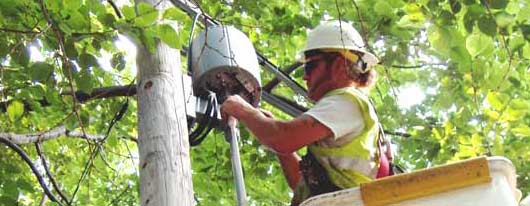
Worker adjusting the wireless access point outside my window.
Featured Tag: Wireless
Main Tags
art
blogging
learning
mac
movies
other
politics
science
tech
wireless
Thursday, January 06, 2005
Communities of Practice
Mary, the Favorite Wife, is involved in an apprenticeship that will lead to her certification as an ASL (American Sign Language) Interpreter. There are three apprentices in the program (actually, they call them proteges but I think apprentice fits the position better).
This sounds like a perfect scenario for establishing a community of practice (COP) and I told Mary I would find some resources for her.
Communities of practice are groups of people who share a concern or a passion for something they do and who interact regularly to learn how to do it better.Etienne Wenger, Communities of Practice: A Brief Introduction
That is a really beautiful and concise definition by Mr. Wenger. It's really a simple concept that should universally apply to all learning yet, in practice, the process is often derailed by any number of conflicting elements including egos, bureaucracy, and a perceived lack of implementation time.
A COP has three elements: the domain, the community, and the practice.
Members have a committment to a shared domain of interest, in this case interpreting and deaf culture.
In pursuing their interest in their domain, members engage in joint activities and discussions, help each other, and share information. They build relationships that enable them to learn from each other.That's the community part and it should be noted that all participants, experienced and less experienced, will learn from the other participants. COPs need to be careful of hierarchal structures.Etienne Wenger, Communities of Practice: A Brief Introduction
The practice:
Members of a community of practice are practitioners. They develop a shared repertoire of resources: experiences, stories, tools, ways of addressing recurring problems—in short a shared practice. This takes time and sustained interaction.I would add a fourth element to this and that's attitude. While COPs can develop almost transparently within some groups, you can also start looking at your job or education as a COP and begin sharing information (as opposed to hoarding to gain advantage) with co-workers and classmates and expecting the same in return. This kind of attitude starts to cut through personal and political ego trips. Often, work processes will become more efficient and fulfilling and the job will become less stressful. I don't have any quantitative research to back this up but I do have personal experience.

